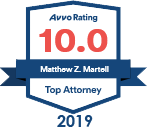High Net Worth Divorces
Lakewood Ranch, Sarasota, Bradenton, and Venice, Florida High Net Worth Divorce Lawyer
High net worth divorces are never simple, and they often come with layers of stress, uncertainty, and emotional strain. When you’ve built a life that includes significant assets, real estate, retirement accounts, and/or ownership in a business, protecting your interests becomes critical. You need a lawyer who not only knows the law but also understands the emotional weight that comes with this kind of divorce. At the Law Offices of Matthew Z. Martell, P.A., we bring years of focused experience to high net worth divorce cases in Lakewood Ranch, Sarasota, Bradenton, and Venice, Florida. We approach every case with a firm commitment to protecting what matters most to our clients—financial security, stability, and peace of mind. Below, the trusted high net worth divorce lawyer at the Law Offices of Matthew Z. Martell, P.A covers key aspects of this type of divorce, what legal options may be available to you, and how working with an experienced Lakewood Ranch, Sarasota, Bradenton, and Venice, Florida divorce attorney can help you move forward with clarity and strength.
What Assets Are Considered in a High Net Worth Divorce?
Marital Vs. Non-Marital Property — Florida Statutes § 61.075 distinguishes between marital property (which is divided) and non-marital property (which generally isn’t). Marital property includes most assets and debts either spouse acquired during the marriage, even if only one person’s name is on the title or account. Non-marital property typically includes things you owned before the marriage or assets you inherited or received as gifts from someone other than your spouse. But if those non-marital assets were mixed with marital funds—like adding your spouse to the deed or combining money into a joint account—they may lose their protection and be divided.
Real Estate Holdings — Homes, rental properties, vacation houses, and undeveloped land often make up a big portion of wealth in a high net worth divorce. Whether it’s the marital home or investment property, these assets need to be identified, appraised, and classified correctly. If you owned the property before the marriage, or bought it with non-marital money, you’ll need to determine how much of the current value is protected.
Business Interests and Professional Practices — If you or your spouse owns a business, that company may be considered a marital asset in full or in part, depending on how and when it was acquired. Valuing a business such as a professional practice takes more than just looking at financial statements—it often requires a formal valuation by a neutral expert. Whether it’s a medical practice, consulting firm, or retail company, a high net worth divorce lawyer can help determine what portion of the business, if any, should be divided.
Retirement and Investment Accounts — Retirement accounts like IRAs, 401(k)s, pensions, and deferred compensation plans are usually included in the marital estate if contributions were made during the marriage. Florida courts typically divide these accounts equitably through a court order known as a Qualified Domestic Relations Order (QDRO). Brokerage accounts, mutual funds, and other investment assets are also subject to equitable division, and their value can change significantly depending on market conditions and tax considerations.
Stock Options and Restricted Shares — Equity compensation like stock options or restricted stock units (RSUs) can be easy to overlook but may be worth a lot. If earned during the marriage, these are generally considered marital property, even if they haven’t vested yet. A professional analysis is often needed to determine how to fairly divide this type of asset, especially if the valuation depends on future performance or employment conditions.
Trusts, Inheritances, and Offshore Accounts — Trusts and inherited assets may not be considered marital, but if they’ve been commingled with marital property, a portion of the assets could be subject to division. Offshore accounts and foreign investments add another layer of complexity and must be disclosed as part of the financial affidavit process. If one spouse tries to hide money overseas or in trusts, a high net worth divorce lawyer can work with forensic experts to track it down and bring it into the case.
How Does Florida Divide Property in a High Net Worth Divorce?
Florida’s Equitable Distribution Law — Florida uses the equitable distribution rule under § 61.075 of the Florida Statutes to divide assets and debts. This means the court tries to divide things fairly, but that does not always mean equally. In a high net worth case, what’s considered “fair” can depend on a lot of things, including how long you were married, whether one of you gave up a career to support the other, or if one person wasted or hid money. Judges also look at the types of assets and how easily they can be divided without losing value.
Understanding Marital And Non-Marital Property — One of the first steps is figuring out what counts as marital property and what doesn’t. Generally, anything you or your spouse got during the marriage is considered marital. This includes wages, homes, retirement contributions, and business earnings. On the other hand, things you owned before the marriage, or gifts or inheritances you got from someone other than your spouse, are considered non-marital. But if you mixed that non-marital asset with marital money—like using inheritance funds to renovate a jointly owned house—it may become part of the marital estate. That’s where many disputes come from in high asset divorces.
Dealing With Complex Asset Structures — High net worth divorces often involve partnerships, business entities, investment portfolios, or layered trusts. If you or your spouse holds ownership through LLCs or corporations, the court still needs to figure out whether those interests are marital and what they’re worth. This usually requires outside experts. Florida courts may also divide certain assets unequally to account for liquidity, tax consequences, or the unique nature of the property, as long as the overall split is still considered fair.
When Unequal Can Still Be Fair — A judge might award more of one type of asset to one spouse if it makes practical sense—like giving the business owner full control of their company while the other spouse receives more cash or real estate. Under § 61.075, the court can do this if there’s a strong justification. Unequal distribution can also happen if one spouse intentionally depleted assets, failed to disclose accounts, or made poor financial choices during the end of the marriage.
Can You Protect Your Assets During a High Net Worth Divorce?
 Using Prenups and Postnups — If you and your spouse signed a prenuptial or postnuptial agreement, it can limit what’s divided and how. Florida courts generally enforce these agreements under § 61.079, as long as they were signed voluntarily and with full financial disclosure. If the agreement is valid, it can protect business interests, real estate, or inheritance rights, and take certain assets off the table entirely. But if the agreement was poorly drafted or one spouse was highly pressured into signing it, then it may not hold up in court.
Using Prenups and Postnups — If you and your spouse signed a prenuptial or postnuptial agreement, it can limit what’s divided and how. Florida courts generally enforce these agreements under § 61.079, as long as they were signed voluntarily and with full financial disclosure. If the agreement is valid, it can protect business interests, real estate, or inheritance rights, and take certain assets off the table entirely. But if the agreement was poorly drafted or one spouse was highly pressured into signing it, then it may not hold up in court.
Hiring Forensic Accountants to Investigate Finances — In high net worth divorces, it’s common for one spouse to be less informed about the family’s finances. A forensic accountant can trace money, value assets, and look for hidden accounts or unusual transactions. If there’s any concern that your spouse is trying to hide income, understate business revenue, or transfer assets to someone else, a lawyer may bring in one of these financial experts to build your case.
Separating Out Non-Marital Assets — Just because you brought money or property into the marriage doesn’t mean it’s automatically protected. If you kept it in your own name and didn’t mix it with marital funds, it may still be yours alone. But if you added your spouse’s name to an account, used joint funds to maintain or improve the asset, or treated it like marital property, some or all of it might be subject to division.
Protecting Business Interests — If you own a business, you probably want to keep control of it after the divorce. That’s possible, but it takes careful planning. You may need to have the business valued by a neutral expert and negotiate a buyout if any portion of it is marital. If your spouse worked for the business or contributed to its growth, they may be entitled to part of its value. Florida law allows the court to award the full business to one spouse while offsetting the value with other assets, but that doesn’t happen automatically—you need to make the right legal and financial arguments.
Avoiding Mistakes That Cost You — One of the biggest risks in a high net worth divorce is accidentally giving up rights or making decisions that later cost you. Moving money between accounts, changing beneficiaries, or transferring property during the divorce can backfire. Florida law requires full financial transparency once the case begins. Trying to hide assets or take control of joint property without court approval can damage your credibility and hurt your case. Working with a qualified divorce attorney from the start can help you avoid these missteps and protect what you’ve built.
What About Alimony in a High Asset Divorce in Lakewood Ranch, Sarasota, Bradenton and Venice, Florida?
How Florida Law Handles Alimony — In a high asset divorce in Lakewood Ranch, Sarasota, Bradenton, and Venice, Florida, alimony is governed by § 61.08 of the Florida Statutes which allows the court to award support when one spouse demonstrates a need and the other has the ability to pay. The court considers various factors, including the length of the marriage, , sources of current income, and standard of living established during the marriage.
Types Of Alimony That May Apply — Several types of alimony may apply: bridge-the-gap for transitional needs, rehabilitative for new career preparation, and durational for time-limited support. Judges have broad discretion under the statute and evaluate each spouse’s financial position, lifestyle, education, and earning capacity.
How Are Children Affected in a High Net Worth Divorce?
Child Support in High Income Cases — Florida’s child support system is governed by § 61.30 of the Florida Statutes. The law uses a formula based on each parent’s income, the number of overnights with the child, and specific child-related expenses. However, in high net worth cases where income exceeds the standard guidelines, the court has discretion to set a higher amount if needed to meet the child’s needs. That might include private school, tutoring, or other costs that go beyond the basics.
Covering Extra Expenses Like Private School — If your children are used to a certain standard of living, the court may require both parents to continue covering private school tuition, extracurricular activities, or travel costs. Florida law allows the court to order additional support beyond the guideline amount when it serves the child’s best interest. These costs can be shared proportionally based on each parent’s income or negotiated as part of a parenting plan.
Creating a Parenting Plan That Works — Florida requires all parents going through divorce to submit a parenting plan that outlines how they will share time and decision-making. This is addressed in § 61.13. In high net worth families, parenting plans may need to accommodate things like frequent travel, multiple homes, and nanny or caregiver schedules. The goal is to create a stable routine for the children that still reflects the reality of the parents’ lives.
Dealing With International or Long-Distance Issues — If one parent wants to relocate out of state or even internationally, Florida law requires court approval if the move is more than 50 miles away and affects the other parent’s time-sharing rights. This is also covered under § 61.13001. In high net worth cases, these disputes can sometimes involve complex travel arrangements, dual citizenship concerns, or international school options.
How Long Does a High Net Worth Divorce Take in Florida?
High net worth divorces in Florida often take significantly longer than standard cases due to the complexity of financial matters involved. While a typical divorce might conclude in a year to two years, high asset cases can stretch well beyond two years. Under § 61.075 of the Florida Statutes, parties must fully disclose and classify all marital and non-marital assets—often including businesses, real estate portfolios, and investments—which can trigger disputes over valuation and ownership. Delays frequently arise from uncooperative spouses, document production issues, or the need to hire forensic accountants or real estate appraisers.
Determining income for support, especially when one spouse is self-employed or has variable investment returns, also adds time. § 61.11 permits courts to issue temporary relief for alimony, child support, and asset control during the case. Florida strongly encourages mediation before trial, which can speed resolution if both sides are willing, but contentious cases often end up in lengthy litigation.
How Much Does a High Net Worth Divorce Cost in Sarasota, Bradenton, and Venice, Florida?
High net worth divorces in Lakewood Ranch, Longboat Key, Anna Maria Island, Sarasota, Siesta Key, Casey Key, Manasota Key, and Venice, Florida tend to be more expensive than standard cases due to the complexity involved in dividing substantial assets and resolving financial issues. Florida law, particularly § 61.16 of the Florida Statutes, plays a key role by allowing courts to award attorney’s fees based on financial disparity, ensuring both parties can afford representation. These cases often involve forensic accountants, business valuation experts, and real estate appraisers, which can increase overall costs.
Legal fees vary widely, especially if litigation is prolonged. Since Florida does not set a fixed cost for divorce, fees depend heavily on how contested the matter becomes and the hourly rates of legal professionals involved. To control costs, cooperation, document readiness, and considering more than one mediation over court battles can be highly effective. If one spouse controls resources, temporary alimony and/or attorney’s fee and cost support may be available under the statute.
Should You Hire a High Asset Divorce Lawyer in Lakewood Ranch, Sarasota, Bradenton, and Venice, Florida?
High net worth divorces in Lakewood Ranch, Sarasota, Bradenton, and Venice, Florida demand a divorce lawyer with deep experience in Florida’s complex financial and legal landscape. These cases often involve intricate assets such as closely held businesses, stock portfolios, significant real estate, and sometimes offshore accounts, all of which require meticulous handling. Florida Rule 12.285 mandates comprehensive financial affidavits from both parties—an overwhelming task without legal guidance. A seasoned divorce attorney ensures full disclosure, detects hidden assets, and navigates Florida’s equitable distribution rules under § 61.075, where fairness—and not necessarily always a strict 50/50 split—determines asset division.
Alimony, governed by § 61.08, adds further complexity, as such support awards are sometimes discretionary and often contested. Choosing the right divorce lawyer means finding someone who regularly deals with business valuations, retirement holdings, and high-value property, with a strategic mindset for both settlement and litigation.
Frequently Asked Questions About Divorce for Wealthy Individuals in Sarasota, Bradenton, and Venice, Florida
How do I know if my divorce is considered high net worth in Florida?
If you and your spouse have at least $3,500,000.00 in combined net assets in your marital estate— including real estate, businesses, investments, and retirement accounts— your divorce is likely considered high net worth and will require more detailed financial work.
Can my spouse take part of my business in a high net worth divorce?
Yes, if the business was started or grew during the marriage, it may be classified as marital property under Florida Statutes § 61.075. A court can award a portion of its value to your spouse, even if only your name is on it.
Do I need a special lawyer for a high net worth divorce?
You should hire a lawyer who regularly handles high net worth divorce cases. These cases are more complicated and require experience with financial experts, valuations, and detailed asset tracing that general divorce lawyers may not deal with often.
How long does a complex asset divorce usually take?
It depends on how complex your assets are and whether you and your spouse can agree on major issues. These cases often take two years or longer if there’s litigation over property, financial support, and/or custody and timesharing.
Will I have to split my retirement or pension accounts?
If retirement funds were earned during the marriage, they’re usually considered marital property and must be divided fairly under Florida Statutes § 61.075. That includes pensions, 401(k)s, IRAs, and similar accounts, even if they’re only in one spouse’s name.
What if my spouse is hiding assets?
You can request financial discovery and hire a forensic accountant to trace hidden accounts or property. Florida courts can penalize a spouse who tries to hide money, and that can affect how assets are divided.
Can I still get alimony if we split everything 50/50?
Yes. Florida Statutes § 61.08 allows for alimony based on need and ability to pay, not just how assets are split. If your spouse earns much more, the court can award alimony even if you get half of the marital property.
Do we have to go to trial for a high net worth divorce?
No, many of these cases are settled through mediation. Going to trial is usually a last resort. But if there’s no agreement on key issues, a trial may be necessary, especially when dealing with business valuations or hidden income.
What happens to our children in a high asset divorce?
Child custody, timesharing, and child support decisions are based on the child’s best interests, not your income level. But in high asset cases, courts may also consider things like private school, travel, and extracurricular costs when setting support.
Can I protect my inheritance from being split?
Maybe. If your inheritance was kept separate and not mixed with marital funds, it may be considered non-marital. But if you commingled it— like putting it in a joint account— it might become part of the marital estate and be subject to division.
Lakewood Ranch, Sarasota, Bradenton, and Venice, Florida High Net Worth Divorce Lawyer | Complex Asset Divorce Attorneys
Going through a high net worth divorce isn’t just about dividing property—it’s about protecting your future, your peace of mind, and everything you’ve worked so hard to build. Whether you’re the one seeking the divorce or trying to respond to it, the financial and emotional pressure can be overwhelming. At the Law Offices of Matthew Z. Martell, P.A., our trusted experienced Lakewood Ranch, Sarasota, Bradenton, and Venice, Florida high net worth divorce attorney has spent years helping clients through the most challenging chapters of their lives. We understand the stakes. We’ve handled divorce cases involving significant assets, business interests, multiple properties, and contested alimony. We take a strategic, tough-minded approach while always keeping your personal needs and priorities front and center. You don’t have to face this alone. Contact the Law Offices of Matthew Z. Martell, P.A. by calling (941) 556-7020 or contacting us online to see if you qualify for a free 15 minute initial phone consultation to discuss your legal rights, your options, and what to do next.
















































































